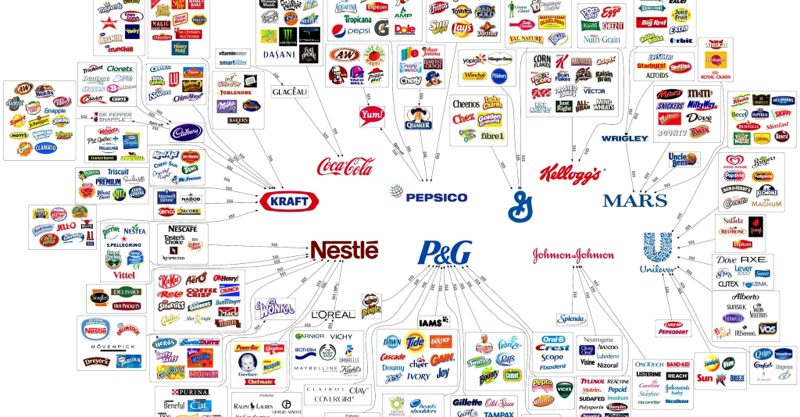Busting the monopoly power of abusive and arrogant food giants is broadly popular—even in Congress.
By Jim Hightower for Creators.com
No longer just a parlor game, monopoly is what's for dinner. Practically every commodity and every step in producing our families' most essential consumer purchases is in the tight grip of four or fewer global conglomerates:
—Four
chemical conglomerates—Bayer (German), BASF (German), ChemChina (Chinese) and
Corteva (U.S.)—control more than 60% of the world's commercial seeds market.
—Tyson
Foods and three other U.S. poultry firms control 60% of the U.S. poultry
market. Three global giants—JBS (Brazil), Tyson (U.S.) and Smithfield
(China)—control 85% of the U.S. beef market and 71% of the pork market.
—Four
multinational grain-trading powers—Cargill, ADM, Bunge and Dreyfus—control 90%
of all grain (corn, wheat, rice, etc.) marketed in the world.
—John
Deere and Italian conglomerate CNH Industrial control nearly half of the U.S.
market for tractors and other farm machinery (even using their monopoly clout
to prohibit farmers from repairing their own machines, forcing them to travel
to expensive authorized dealers for repairs).
—
Multibillion-dollar Wall Street speculators are the nation's biggest buyers of
farmland, jacking up per-acre prices beyond what family farmers (especially
young people trying to get into farming) can pay; indeed, the largest owner of
U.S. ag land is superrich tech mogul Bill Gates, who holds land in almost 20
states that would amount to a nearly 400-square-mile farm (bigger than four
Seattles, the sprawling metropolis where he lives).
Joe Biden has been a lifelong policy minimalist, but when running for president, he at least recognized the need to "combat corporate power," promising to "make sure farmers and producers have access to fair markets."
Rhetoric aside, there is, at this point, no sense that he and his inside team
grasp the structural enormity of what's at stake, nor have they come up with
proposals to do the heavy lifting necessary to free America from the monopoly
yoke.
Nonetheless, farm, labor, consumer, environmental and other progressive advocates should move a broad, aggressive anti-monopoly initiative to the top tier of our change agenda, because it can produce big, positive results for nearly every grassroots constituency; there is strong public support for going right at corporate greed; and—uniquely—it's not necessary to pass legislation and set up new programs to get started on this job.
As investigative reporter Amy Swan writes in the January Washington Monthly magazine (and as anti-theft champions such as Zephyr Teachout have advocated for years), we don't have to wait on recalcitrant Republicans and weak-kneed Democrats in Congress to make progress.
A toolshed of laws that were put in
place during the past 100 years to counter monopoly power are still on the
books, stored in the departments of Agriculture, Treasury and Justice; the
Federal Trade Commission; the Federal Communications Commission; the Securities
and Exchange Commission; the Federal Reserve; and so many other drawers of
public power—waiting to be put to work.
There is a direct presidential path to long-term structural change, which would let Joe actually be Rooseveltian by disempowering monopolistic thieves. The place to start is the dinner plate, for clearing it of even some of its immense competitive blockages would produce immediate, tangible benefits for millions of families across America.
Moreover, busting the monopoly power of abusive and arrogant food giants is broadly popular—even in Congress! Some of the best proposals and boldest calls for structuring the anti-competitive food sector are coming from such middle-of-the-road Biden backers as Sens. Cory Booker, Amy Klobuchar and Jon Tester, as well as a few Republicans.
Booker, for example, sees the connection between inner-city food deprivation and the consolidation of power by industrial farm and food profiteers, saying, "These corporate agricultural institutions that are growing so large and so powerful are dictating practices that are contrary to our very idea of farming in our country."
Working with progressive grassroots groups like
Food & Water Watch and Family Farm Action, Booker is sponsoring The Farm
System Reform Act, a comprehensive proposal to overhaul major parts of the
broken food structure. Included in his bill are strong, overdue provisions to
phase out the monstrous system of CAFOs (concentrated animal feeding
operations) that are torturous hellholes for thousands of chickens, hogs and
other animals, as well as sickening polluters of water, air and rural
communities.
Rather
than conventional liberal programs to treat the symptoms of monopoly, such
progressive populist approaches begin to dismantle monopoly—and they
represent our best chance during the Biden presidency of actually making life
fairer for the majority of the people.
Jim Hightower is
a national radio commentator, writer, public speaker, and author of the books
"Swim Against The Current: Even A Dead Fish Can Go With
The Flow" (2008) and "There's Nothing in the Middle of the
Road But Yellow Stripes and Dead Armadillos: A Work of Political Subversion"
(1998). Hightower has spent three decades battling the Powers That Be on behalf
of the Powers That Ought To Be - consumers, working families,
environmentalists, small businesses, and just-plain-folks.
